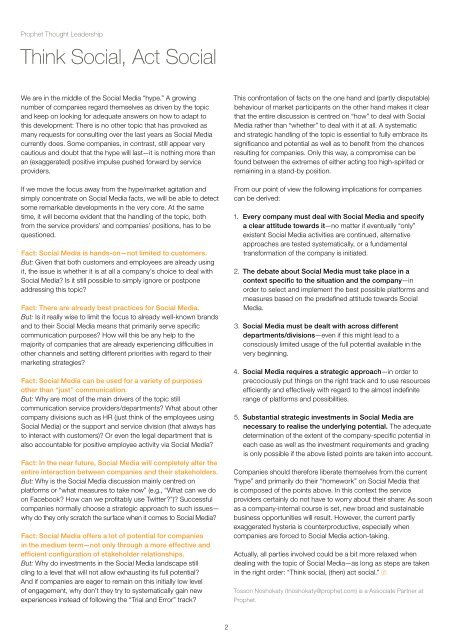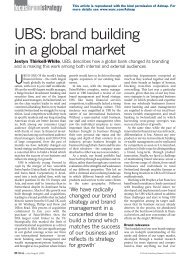INSPIRED AND ACTIONABLE IDEAS - Prophet
INSPIRED AND ACTIONABLE IDEAS - Prophet
INSPIRED AND ACTIONABLE IDEAS - Prophet
Create successful ePaper yourself
Turn your PDF publications into a flip-book with our unique Google optimized e-Paper software.
<strong>Prophet</strong> Thought Leadership<br />
Think Social, Act Social<br />
We are in the middle of the Social Media “hype.” A growing<br />
number of companies regard themselves as driven by the topic<br />
and keep on looking for adequate answers on how to adapt to<br />
this development: There is no other topic that has provoked as<br />
many requests for consulting over the last years as Social Media<br />
currently does. Some companies, in contrast, still appear very<br />
cautious and doubt that the hype will last—it is nothing more than<br />
an (exaggerated) positive impulse pushed forward by service<br />
providers.<br />
If we move the focus away from the hype/market agitation and<br />
simply concentrate on Social Media facts, we will be able to detect<br />
some remarkable developments in the very core. At the same<br />
time, it will become evident that the handling of the topic, both<br />
from the service providers’ and companies’ positions, has to be<br />
questioned.<br />
Fact: Social Media is hands-on—not limited to customers.<br />
But: Given that both customers and employees are already using<br />
it, the issue is whether it is at all a company’s choice to deal with<br />
Social Media? Is it still possible to simply ignore or postpone<br />
addressing this topic?<br />
Fact: There are already best practices for Social Media.<br />
But: Is it really wise to limit the focus to already well-known brands<br />
and to their Social Media means that primarily serve specific<br />
communication purposes? How will this be any help to the<br />
majority of companies that are already experiencing difficulties in<br />
other channels and setting different priorities with regard to their<br />
marketing strategies?<br />
Fact: Social Media can be used for a variety of purposes<br />
other than “just” communication.<br />
But: Why are most of the main drivers of the topic still<br />
communication service providers/departments? What about other<br />
company divisions such as HR (just think of the employees using<br />
Social Media) or the support and service division (that always has<br />
to interact with customers)? Or even the legal department that is<br />
also accountable for positive employee activity via Social Media?<br />
Fact: In the near future, Social Media will completely alter the<br />
entire interaction between companies and their stakeholders.<br />
But: Why is the Social Media discussion mainly centred on<br />
platforms or “what measures to take now” (e.g., “What can we do<br />
on Facebook? How can we profitably use Twitter?”)? Successful<br />
companies normally choose a strategic approach to such issues—<br />
why do they only scratch the surface when it comes to Social Media?<br />
Fact: Social Media offers a lot of potential for companies<br />
in the medium term—not only through a more effective and<br />
efficient configuration of stakeholder relationships.<br />
But: Why do investments in the Social Media landscape still<br />
cling to a level that will not allow exhausting its full potential?<br />
And if companies are eager to remain on this initially low level<br />
of engagement, why don’t they try to systematically gain new<br />
experiences instead of following the “Trial and Error” track?<br />
This confrontation of facts on the one hand and (partly disputable)<br />
behaviour of market participants on the other hand makes it clear<br />
that the entire discussion is centred on “how” to deal with Social<br />
Media rather than “whether” to deal with it at all. A systematic<br />
and strategic handling of the topic is essential to fully embrace its<br />
significance and potential as well as to benefit from the chances<br />
resulting for companies. Only this way, a compromise can be<br />
found between the extremes of either acting too high-spirited or<br />
remaining in a stand-by position.<br />
From our point of view the following implications for companies<br />
can be derived:<br />
1. Every company must deal with Social Media and specify<br />
a clear attitude towards it—no matter if eventually “only”<br />
existent Social Media activities are continued, alternative<br />
approaches are tested systematically, or a fundamental<br />
transformation of the company is initiated.<br />
2. The debate about Social Media must take place in a<br />
context specific to the situation and the company—in<br />
order to select and implement the best possible platforms and<br />
measures based on the predefined attitude towards Social<br />
Media.<br />
3. Social Media must be dealt with across different<br />
departments/divisions—even if this might lead to a<br />
consciously limited usage of the full potential available in the<br />
very beginning.<br />
4. Social Media requires a strategic approach—in order to<br />
precociously put things on the right track and to use resources<br />
efficiently and effectively with regard to the almost indefinite<br />
range of platforms and possibilities.<br />
5. Substantial strategic investments in Social Media are<br />
necessary to realise the underlying potential. The adequate<br />
determination of the extent of the company-specific potential in<br />
each case as well as the investment requirements and grading<br />
is only possible if the above listed points are taken into account.<br />
Companies should therefore liberate themselves from the current<br />
“hype” and primarily do their “homework” on Social Media that<br />
is composed of the points above. In this context the service<br />
providers certainly do not have to worry about their share: As soon<br />
as a company-internal course is set, new broad and sustainable<br />
business opportunities will result. However, the current partly<br />
exaggerated hysteria is counterproductive, especially when<br />
companies are forced to Social Media action-taking.<br />
Actually, all parties involved could be a bit more relaxed when<br />
dealing with the topic of Social Media—as long as steps are taken<br />
in the right order: “Think social, (then) act social.”<br />
Tosson Noshokaty (tnoshokaty@prophet.com) is a Associate Partner at<br />
<strong>Prophet</strong>.<br />
2










